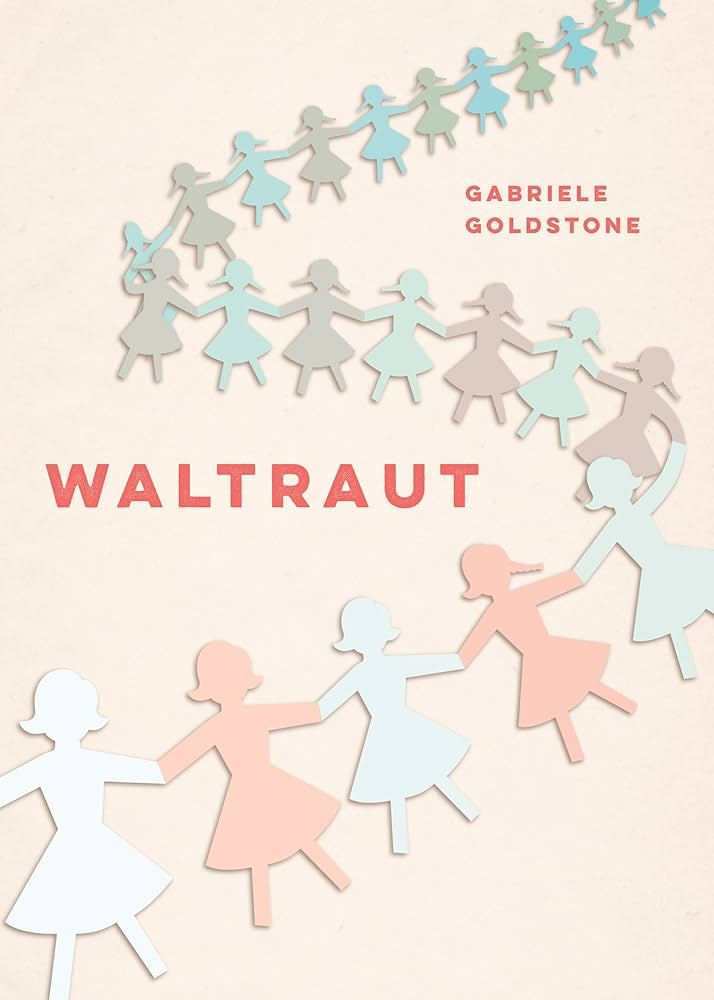Waltraut

Waltraut
"Your shoelace is undone." Betty-Ann points at my feet, her charm bracelet jingling.
I look down at the offending lace, grimace, and bend over to tie it. This will take concentration because my fingers jiggle like jelly.
The swing stops squeaking.
"She's so clumsy."
I look up, unsure who's spoken. Four girls stare down at me, the whites of their eyes cold like snowballs, irises beady like crows.
I crouch lower and huddle over my laces. When I glance around again, four sets of shiny black patent leather shoes have formed a semicircle around me -- white socks brilliant in the morning sunlight -- each icy and accusing.
"What's taking you so long to tie a shoe?" Definitely Betty-Ann's voice. Giggles join her charm bracelet's tinkle.
I focus on the stupid lace. It's frayed and won't fit back into the eyelet. I stick it in my mouth to moisten it and make it pointier.
"Did you see that?" Betty-Ann again.
"Yeah. Disgusting."
I look up. That was Barbara. I thought she'd be kinder. She'd smiled at me earlier, but maybe now she knows better.
I finally get the stupid lace into the stupid eyelet and tie a stupid double knot instead of a bow. It's faster -- for now -- but I'll regret it later.
"And she can't even tie a bow." Betty-Ann again. "Let's go and find something more intelligent to watch than a clumsy artist."
"Good idea," Barbara says. "Immigrants are boring."
In the years following the Second World War, it must never have been easy to be the child of German immigrants, but I had forgotten just how cruel, clique-y, and frankly how downright bitchy, 11-year-old girls can be. Waltraut is obviously a very German name, but there is no reason why she should be taunted by the classroom bullies by having it rhymed with 'Kraut'. She had been born in Canada after all, and it is now 1965. Bygones should have been bygones. However, it is also the beginning of the era when upper elementary classes begin to study the Holocaust, and Waltraut has just had to sit through an emotional presentation by a Jewish concentration-camp survivor. Why should she be blamed for the evils done by the Nazis! But she is, and so she hates school. She also hates being poor; she hates having to help Mami in the kitchen, peeling endless potatoes for dinner, and she hates that her younger brother Sonny seems to get away with everything. Weekends are her salvation because then she goes to German school on Saturday mornings where she has real friends, and to a German church where she can sit with the same friends and pass notes back and forth and giggle, and not listen to the fire-and-brimstone sermons that condemn Papi as a sinner because he smokes, drinks beer (on occasion), and has not been "saved", i.e., has not had a conversion experience. In other words, somewhere where she can deny her Canadian heritage in favour of her German one! However, she loves Papi unreservedly and Mami most of the time, and she loves reading, especially Nancy Drew mysteries; so life is not all doom and gloom.
The action begins when Sonny falls out of a tree, breaking his leg rather severely. This means that he has to stay in hospital for six weeks, and that means that his room is empty; so renting it to a friend of Papi's named Walter, shortened to Wally, is economically reasonable. So he takes over not only Sonny's room, but Waltraut's nickname of Wali. Disruptive, to say the least. However, his rent helps with the cost of Sonny's hospital stay (no universal healthcare in the sixties!) and when Sonny comes home, Walter/Wally constructs a room for himself (at his own expense) in the basement and continues to live with the family.
Usually working at problems and coming to grips with them is preferable to running away from them, but sometimes the latter does actually help. Papi, having survived the war, has had enough of always being careful and wants to live life in the now. So, in spite of Mami's trepidation at the prospect of more debt (horrors!) and interest payments (more horrors!) the family moves – Into a new house in the suburbs and a school where everyone is new and having to make new friends, where Waltraut can choose to be called Nancy if she wishes (and she does) and where her teacher is sympathetic, and he allows her to write nothing but mysteries if she wishes (and she does). He is also appreciative of the good bits and critical of the bad ones of her stories, just as if she were a real author. And then, in the final paragraph or so of the book, he gently suggests that her own story might just be more interesting than another Nancy take-off, a revelation, that results in the concluding sentence: "I'm Waltraut, and this is my story."
Waltraut is a mixed-up pre-teen. We all recognize the symptoms, having gone through at least some of the stages ourselves, some more painfully than others, but the story of her passage through the good times and the unpleasant ones is illuminating for those who think they are alone in not being part of the in-group, or who are being teased for being different. It is also nostalgic for those who have put those years thankfully behind them! Waltraut is definitely not a heroic hero, but she is very real, very sympathetic, and altogether a person whom one would like to get to know.
Mary Thomas is thankfully past her pre-teen years of insecurity, but she found revisiting them through Waltraut's experiences to be illuminating as well as engaging and interesting.
